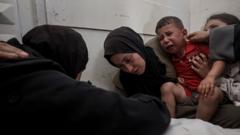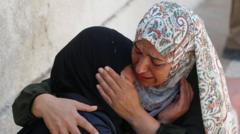**According to Israeli Defense Forces, the death of commander Saeed Izadi undermines Iranian influence in the region while escalating tensions on both sides amid continued hostilities.**
**Israel Targets Iranian Military Leader Linked to Hamas Attack**

**Israel Targets Iranian Military Leader Linked to Hamas Attack**
**In a recent military operation, Israel claims to have killed an Iranian commander linked to Hamas's significant assault on October 7, marking a pivotal moment in ongoing conflict.**
Israel has announced the death of a senior military commander from Iran, accusing him of orchestrating Hamas's deadly attack on October 7, 2023, which resulted in approximately 1,200 fatalities in southern Israel. The Israel Defense Forces (IDF) reported that Saeed Izadi was eliminated in a strike targeting an apartment building in Qom, south of Tehran, on Saturday. IDF chief Eyal Zamir emphasized the significance of this operation, asserting that Izadi had "the blood of thousands of Israelis on his hands," dubbing it a considerable achievement both in intelligence and execution.
While Iranian authorities have yet to verify Izadi's death, they have previously denied any complicity in Hamas's aggressive acts. The IDF attributes to Izadi a pivotal role in coordinating military operations and providing resources to Palestinian militant groups, marking him as a central figure in Iran's clandestine dealings with Hamas.
Earlier, in an international context, the IDF reported the assassination of another key commander from Iran’s Revolutionary Guards Corps (IRGC), Behnam Shahriyari, in a drone strike as he traversed western Iran, where he was responsible for supplying missiles to proxy groups like Hamas and Hezbollah.
These strikes are clear indicators of the escalating violence, coinciding with ongoing military actions and mutual exchanges of attacks between Israel and Iran as tensions rise. The conflict, now entering its ninth day, has amplified concerns about potential US involvement, with Iranian officials warning that any American participation would exacerbate the situation.
Iran's Foreign Minister Abbas Araghchi reiterated Iran's stance, announcing the country would not return to nuclear negotiations until Israel’s military actions ceased. Reports suggest that since mid-June, about 430 people in Iran, including military personnel, have lost their lives in the conflict, while Israeli reports indicate the death of 25 individuals amid renewed hostilities. As each side continues to retaliate, the regional implications of such high-profile killings present grim prospects for a resolution.
While Iranian authorities have yet to verify Izadi's death, they have previously denied any complicity in Hamas's aggressive acts. The IDF attributes to Izadi a pivotal role in coordinating military operations and providing resources to Palestinian militant groups, marking him as a central figure in Iran's clandestine dealings with Hamas.
Earlier, in an international context, the IDF reported the assassination of another key commander from Iran’s Revolutionary Guards Corps (IRGC), Behnam Shahriyari, in a drone strike as he traversed western Iran, where he was responsible for supplying missiles to proxy groups like Hamas and Hezbollah.
These strikes are clear indicators of the escalating violence, coinciding with ongoing military actions and mutual exchanges of attacks between Israel and Iran as tensions rise. The conflict, now entering its ninth day, has amplified concerns about potential US involvement, with Iranian officials warning that any American participation would exacerbate the situation.
Iran's Foreign Minister Abbas Araghchi reiterated Iran's stance, announcing the country would not return to nuclear negotiations until Israel’s military actions ceased. Reports suggest that since mid-June, about 430 people in Iran, including military personnel, have lost their lives in the conflict, while Israeli reports indicate the death of 25 individuals amid renewed hostilities. As each side continues to retaliate, the regional implications of such high-profile killings present grim prospects for a resolution.




















